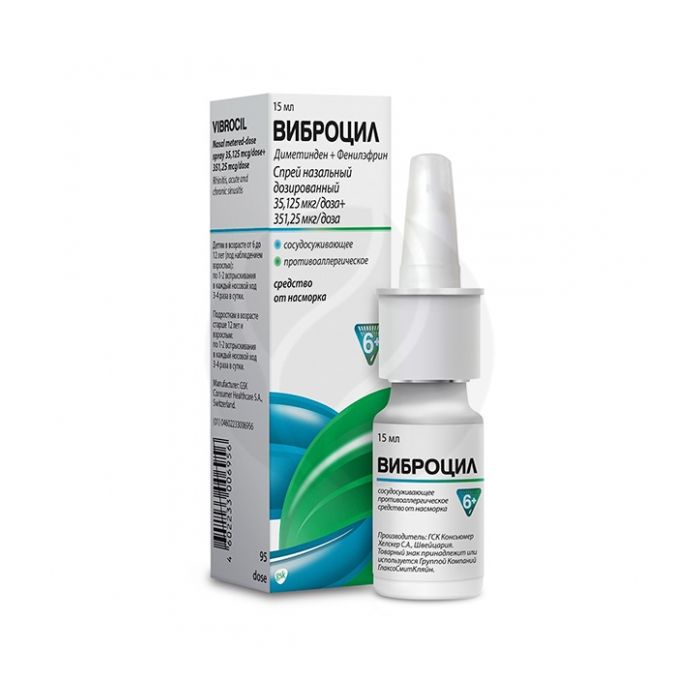Vibrocil spray, 15ml
Expiration Date: 05/2027
Russian Pharmacy name:
Виброцил спрей, 15мл
Acute rhinitis (including colds);
allergic rhinitis (including hay fever);
vasomotor rhinitis;
chronic rhinitis;
acute and chronic sinusitis;
acute otitis media (as an adjuvant);
preparation for surgical interventions in the nasal area and elimination of edema of the nasal mucosa and paranasal sinuses after surgery in this area.
Children under 6 years of age: Contraindicated.
Children aged 6 to 12 years (under the supervision of adults): 1-2 sprays in each nasal passage 3-4 times / day.
For adolescents over the age of 12 and adults: 1-2 sprays in each nasal passage 3-4 times / day. When using a spray, the spray should be held vertically, tip up. Keeping the head straight, insert the tip into the nasal passage, squeeze the nebulizer once with a short sharp movement, and, removing the tip from the nose, unclench it. It is recommended to inhale slightly through the nose while spraying. Before the administration of the drug, the nasal passages should be thoroughly cleaned. The drug should not be used continuously for more than 7 days. If symptoms persist, a doctor should be consulted.
Nasal spray in the form of a clear solution from colorless to slightly yellow, with a faint lavender odor.
1 ml
phenylephrine 2.5 mg
dimethindene maleate 0.25 mg
Excipients: sodium hydrogen phosphate - 4.4 mg, citric acid monohydrate - 2.6 mg, sorbitol - 35 mg, benzalkonium chloride solution 50% (benzalkonium chloride) - 0.2 mg (0.1 mg), lavender oil - 0.2 mg, purified water - up to 1 ml ...
Atrophic rhinitis (including with fetid discharge - ozena);
simultaneous administration of MAO inhibitors and a period up to 14 days after their cancellation;
children under 6 years of age;
angle-closure glaucoma;
hypersensitivity to phenylephrine, dimetindene maleate or other components of the drug.
The drug should be used with caution in cardiovascular diseases (arterial hypertension, arrhythmias, generalized atherosclerosis), hyperthyroidism, prostate adenoma, diabetes mellitus, bladder neck obstruction (for example, due to prostatic hypertrophy), epilepsy. As with the use of any local vasoconstrictor drugs, care should be taken when prescribing VibrocilЃ to patients with severe reactions to sympathomimetics, manifested in the form of insomnia, dizziness, tremors, cardiac arrhythmias or increased blood pressure.
pharmachologic effect
A drug with a vasoconstrictor and antiallergic effect for local use in diseases of the upper respiratory tract.
Phenylephrine is a sympathomimetic, when applied topically, it has a moderate vasoconstrictor effect (due to stimulation of ? 1-adrenergic receptors located in the venous vessels of the nasal mucosa), eliminates edema of the nasal mucosa and its paranasal sinuses.
Dimetindene is an anti-allergic agent - an antagonist of histamine H1 receptors; does not reduce the activity of the ciliated epithelium of the nasal mucosa.
Pharmacokinetics
VibrocilЃ is intended for local use, and its activity does not depend on the concentration of active substances in the blood plasma.
Side effect
From the respiratory system: rarely - discomfort in the nose, dryness in the nose, nosebleeds.
Local reactions: rarely - burning sensation in the area of ??application.
If any of the side effects indicated in the instructions are aggravated, or you notice any other side effects that are not indicated in the instructions, inform your doctor.
Application during pregnancy and lactation
Given the possible systemic vasoconstrictor effect, VibrocilЃ is not recommended for use during pregnancy and lactation (breastfeeding).
Application in children
In children under 6 years of age, only nasal drops are used.
special instructions
VibrocilЃ in the form of a gel is especially indicated in case of dryness of the nasal mucosa, in the presence of crusts, in the aftermath of a nasal injury, as well as to prevent nasal congestion at night. VibrocilЃ should not be used continuously for more than 7 days without consulting a doctor. Prolonged or excessive use of the drug can cause tachyphylaxis and the 'rebound' effect associated with the re-development of nasal congestion (rhinitis medicamentosa), leading to the development of a systemic vasoconstrictor effect. The recommended doses of VibrocilЃ should not be exceeded, otherwise manifestations of the systemic action of the drug may develop, especially in children and elderly patients. In children under the age of 6, only nasal drops are used. VibrocilЃ does not have a sedative effect (does not affect the speed of psychomotor reactions).
Influence on the ability to drive vehicles and mechanisms
Does not affect.
Overdose
An overdose of VibrocilЃ can cause sympathomimetic effects, for example, heart palpitations, premature contraction of the ventricles of the heart, headache in the occiput, tremors, fatigue, increased blood pressure, emotional excitement, insomnia, pallor of the skin. The drug can also cause mild sedation, dizziness, stomach pain, nausea, and vomiting.
Treatment: the use of activated charcoal, laxatives in young children; in adults and children over 6 years old - taking a large amount of liquid. There is no specific antidote. The increased blood pressure caused by phenylephrine can be eliminated with the use of alpha-blockers.
Drug interactions
Phenylephrine (like other vasoconstrictor drugs) is contraindicated in patients receiving MAO inhibitors at this time or have received them within the previous 2 weeks.
You should not simultaneously prescribe the drug with tri- and tetracyclic antidepressants, beta-blockers.

